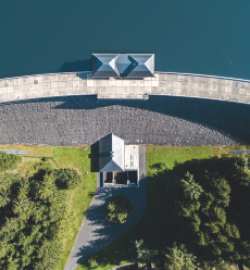The aging of power units, the need to gradually abandon the unprofitable production of electricity from coal and the transition to renewable energy technologies as well as climate change are the 3 important factors influencing the need to develop services consisting in controlling the demand for electricity. Demand Side Response (DSR) is a service that reduces or postpones power consumption by consumers who receive remuneration in return for their readiness to implement this reduction.
Why DSR?
The demand for electricity is not uniform, depends both on the time of day and the season of the year, and must be covered on an ongoing basis by generating sources. In the event of an energy deficit in the energy system (due to the failure of power units, due to extreme weather phenomena - heat waves or severe frosts) and the occurrence of a supply threat, the power system operator - Polskie Sieci Energetyczne (PSE) - tries to ensure the stability of the operation of the power system. One method of ensuring uninterrupted supply, which is only used when critically low levels of reserve capacity are reached, are DSR programs within the capacity market.
DSR is used on a large scale in many countries, the precursors were the United States and Great Britain, but these services are more and more willingly used in more and more countries in Europe and the world. By using demand management, energy supplies can be more reliable, as they constitute an additional reserve that reduces the risk of so-called blackouts.
Calls for reduction
In the event of a threat of a capacity deficit and a lack of available generation capacity, PSE may call on the participants of DSR programs to reduce power consumption. Such calls, however, are extremely rare. Pursuant to the regulations in force, they may take place under strictly defined conditions, when the power reserves in the NPS fall below the critical level and other remedial measures are used.
The experience gained so far from participation in DSR programs, as well as data from the KPMG report prepared at the request of Enel X in 2020 "Participation of recipients in the Capacity Market - opportunities and threats" indicate that the probable number of actual calls for reduction is relatively low for participants of DSR programs . In the most realistic variant, in the entire analyzed three-year period (2017–2019), the conditions enabling PSE to announce risk periods would occur only for 4 hours within 2 days. The experience of the first year of the capacity market operation confirms these analyzes - despite the record-breaking demand and several failures of large system power plants, the operator did not announce a single threat period. Only short tests were carried out, after which the operator returns over 4,000. PLN / MWh of the effective reduction of power consumption.
DSR and RES
The role of DSR in the power system will grow with the greater share of RES in the Polish energy mix. Renewable Energy Sources, unlike conventional energy, are strongly dependent on the weather. This unpredictability increases the efficiency of maintaining power reserves on the part of consumers, because as statistics show, with increasing power, the percentage of peak powers that are used very rarely increases. The greater share of renewable sources also means a greater demand for flexibility services, which can also be provided by some recipients. These services can be used more often, with shorter lead times and provide support in the daily balancing of the system by PSE, especially if the share of thermal power plants which previously provided such services in the production is decreasing.
DSR and the climate
Climate change is causing more and more frequent weather anomalies. These, in turn, on the one hand strongly affect the potential of renewable energy, in particular wind, and on the other hand, they themselves contribute to the depletion of power reserves. This phenomenon may be caused by failures in the operation of the power plant (due to droughts and river levels falling in summer, or severe frosts in winter) or by increased energy consumption (for example by air conditioners in hot weather). Then, too, there may be a need to limit peak energy consumption to avoid blackout.
Thanks to DSR, consumers pay less for energy
Participation in DSR programs means much greater control over energy consumption in the enterprise. Companies also contribute to increasing the stability of the system, and therefore guarantees uninterrupted energy supplies. On the other hand, the measurable benefit of participation in the Program is the remuneration depending on the reduction potential. Recipients participating in DSR programs can count on remuneration of up to PLN 200,000. PLN annually for the ability to reduce 1 MW, which, given the growing energy prices, is a considerable saving.
